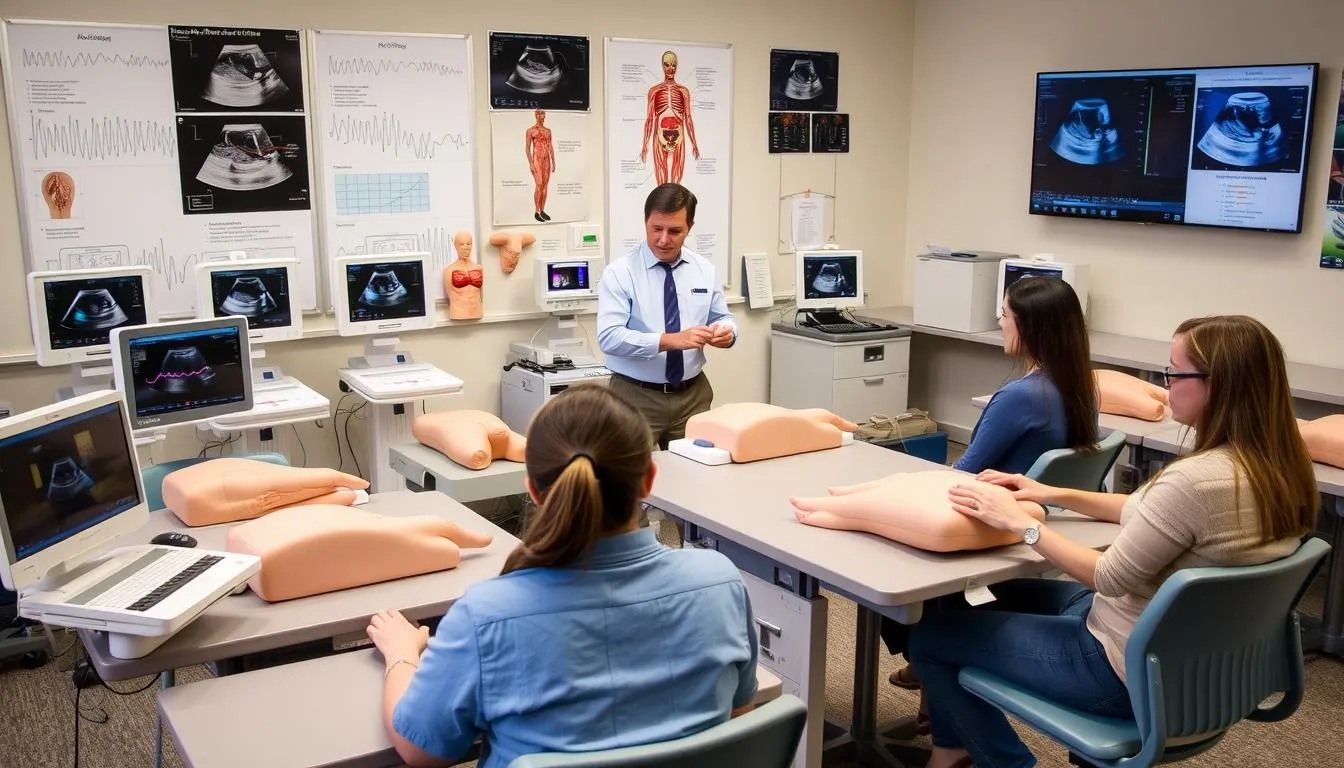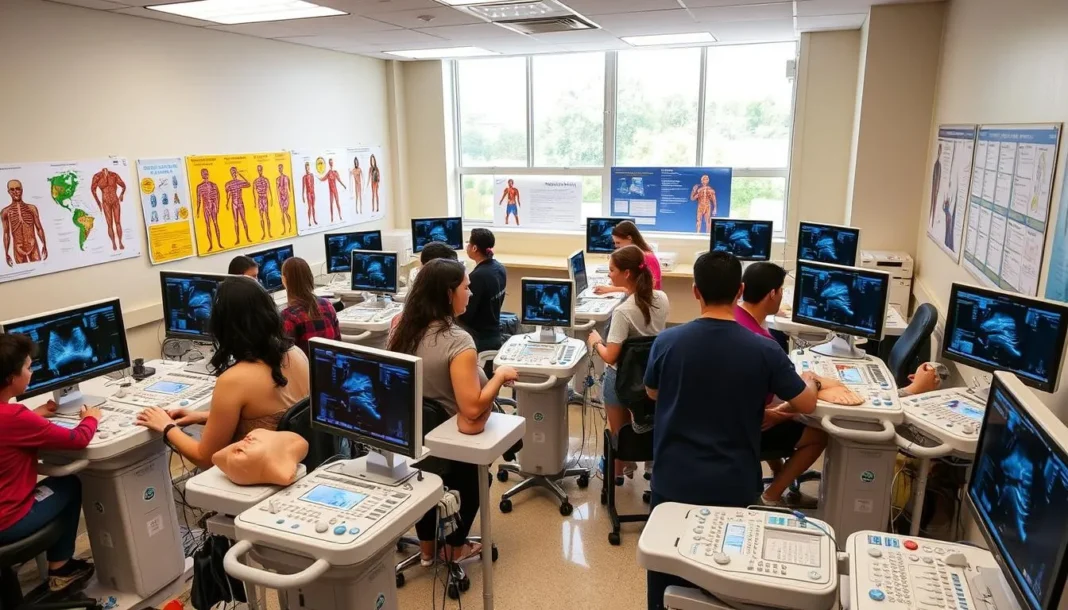Are you thinking about becoming an ultrasound technologist? How long does the training take? This guide covers different program options and their durations.
Ultrasound technology is a fast-growing medical imaging field. It offers exciting career prospects for healthcare and tech enthusiasts.
A vibrant ultrasound tech school classroom, filled with modern ultrasound machines, students engaged in practical training, anatomical models displayed, bright and encouraging atmosphere, large windows letting in natural light, colorful charts on walls depicting human anatomy, high-tech learning environment.
We’ll explore various ultrasound tech programs and their timelines. This info will help you choose the best path for your goals.
We’ll cover program types, durations, and factors affecting training length. The guide also includes curriculum details and accreditation requirements.
You’ll learn about job market trends and financial aspects of ultrasound tech education, which will help you start your journey as a skilled sonographer.
Understanding Ultrasound Technology Programs
Ultrasound technology is a growing medical imaging field. Sonographers use special equipment to capture images of internal body structures.
Doctors use these images to diagnose and monitor medical conditions. Proper education is key for aspiring ultrasound technicians.
Sonography programs teach essential skills and knowledge. Students learn about human anatomy and how to operate ultrasound equipment.
The medical imaging field is always changing. Ultrasound technology leads this transformation.
Understanding sonography programs helps future technicians plan their careers. They can then take steps to enter this rewarding field.
Types of Ultrasound Tech Programs
Ultrasound technicians have many educational options, ranging from associate degrees to bachelor’s degrees in diagnostic medical sonography.
Certificate programs in sonography offer a focused route for healthcare professionals. These programs build on existing medical knowledge and skills.
Associate degree programs typically take two years to complete. They cover topics like human anatomy and medical terminology.
Students also learn hands-on ultrasound scanning techniques. These programs often lead to entry-level positions as ultrasound technicians.
Four-year bachelor’s degree programs offer more in-depth education. They cover advanced imaging modalities and patient care.
These programs also focus on professional development. Graduates are prepared for leadership roles in ultrasound technology.
Certificate programs are shorter, lasting 12 to 18 months. They’re designed for registered nurses or radiologic technologists.
All programs combine classroom learning with hands-on clinical training. This ensures students can provide quality care and use advanced equipment.
Duration of Different Programs
Ultrasound tech programs vary in length. Associate degrees take about 2 years, while bachelor’s degrees take 4 years.
Associate degrees offer a quicker path to the field, while bachelor’s degrees provide more comprehensive education and job opportunities.
Accelerated ultrasound training programs are available for faster entry. These can be completed in 12-18 months.
Accelerated programs have a more intensive curriculum. Students must dedicate significant time and effort to succeed.
Consider your educational and career goals carefully. The program length affects the depth of knowledge and skills acquired.
Weigh the benefits of each option before deciding. Choose the program that best fits your needs.
Factors Influencing Length of Training
Ultrasound tech school duration varies based on several factors. Full-time students usually finish faster than part-time students.
Sonography program factors include different types of degrees. These range from certificates to bachelor’s degrees.
The clinical training requirements are a key part of the program. These hands-on experiences can extend the duration of ultrasound tech school.
Program length can change based on the sonography concentration. Specialized fields may require more time to complete.
Students should research programs carefully before choosing. This helps them plan for their future careers in sonography.
Curriculum Breakdown
Ultrasound tech programs cover key areas of sonography coursework. Students learn essential skills for success in diagnostic sonography.
Core courses include anatomy, physiology, and medical terminology. Students also study patient care and ultrasound technology principles.
Hands-on training is crucial for developing clinical skills. Students learn to use imaging equipment and interpret scans.
An organized classroom setting with students engaged in ultrasound technology training, featuring various ultrasound machines and anatomy models, charts illustrating sound waves and human anatomy, a teacher demonstrating techniques, and students practicing on lifelike mannequins, a bright and inviting educational environment.
The program covers various sonography specialties. These include abdominal, obstetric, and cardiac imaging.
This broad knowledge prepares students for diverse healthcare settings. Graduates can work in hospitals, clinics, and imaging centers.
A complete ultrasound tech curriculum equips students with vital expertise. It paves the way for a rewarding career in medical imaging.
Accreditation and Its Impact
Accreditation is key when picking an ultrasound tech program. It ensures top-notch education and training from respected organizations.
CAAHEP accreditation shows a program meets industry standards. This boosts your credibility and job prospects.
Employers value graduates from accredited schools. They know these grads have the skills to excel.
Accredited programs invest in your future success. They cover essential topics and provide hands-on experience.
Job Market Considerations
The job market for ultrasound technicians is growing fast. The Bureau of Labor Statistics predicts a 14% increase from 2021 to 2031.
Chronic conditions are driving the need for more ultrasound scans. The aging population and new tech are also boosting the job market.
The medical imaging industry growth is key to the strong sonography career outlook.
Hospitals, clinics, and imaging centers offer many job options. Specialized areas like cardiovascular and obstetric ultrasound have promising careers.
Ultrasound technician jobs are plentiful in various healthcare settings. Skilled sonographers can find great opportunities in specialized fields.

Financial Aspects of Ultrasound Tech School
Becoming an ultrasound technician can be costly. Prices vary based on program type and school choice.
Two-year associate’s degrees cost $15,000 to $30,000. Four-year bachelor’s programs can reach $50,000.
Many financial aid options exist for future ultrasound techs, including scholarships, grants, and federal student loans.
Some schools offer sonography-specific scholarships. Employers may provide tuition help for current workers.
Research all options and create a budget. This helps you make smart choices about your future career.
Preparing for Entrance into Programs
Ultrasound tech school admission is competitive. Understanding sonography program prerequisites and creating a strong application can boost your acceptance chances.
Most programs require general education courses. These include anatomy, physiology, and mathematics. Some ask for medical terminology and patient care.
A strong academic record is crucial. Many programs also value volunteer or clinical experience.
Your application should shine. Craft a personal statement that showcases your healthcare passion.
Highlight your problem-solving skills. Show how you’ll impact patients’ lives positively.
Submit all required documents on time. This includes transcripts and recommendation letters.
Prepare thoroughly for ultrasound tech school admission. Stay organized and meet all deadlines.
Showcase your unique qualities. This will help you stand out in the field.
Next Steps After Graduation
Congratulations on finishing school! Your journey as an ultrasound technologist is just starting. The next steps involve passing certification exams and continuing your education.
First, you’ll need to pass the ARDMS certification exam. This important test shows you know your stuff. It also helps you get better jobs in hospitals.
Passing this exam makes you a certified sonographer. With hard work, you can do it!
But continue learning after the exam. Sonography is always changing, and new methods and tools are constantly being developed.
You can keep learning by attending conferences and workshops and obtaining more certifications. This will help you give better care to patients.
Always learning will make you better at your job. It will also help your career grow in ultrasound technology.
FAQ
What is the typical duration of an ultrasound tech school program?
Associate degree programs usually take about 2 years to complete, while bachelor’s degree programs often last around 4 years.
Accelerated options exist for those with healthcare experience. Program length can vary based on individual circumstances.
What types of ultrasound tech programs are available?
Students can choose associate’s or bachelor’s degrees in diagnostic medical sonography. Some programs offer certificates for those with healthcare backgrounds.
What factors can influence the length of an ultrasound tech program?
Enrollment status affects program length. Full-time or part-time study can change the duration.
Clinical experiences and internships may extend the program. Specific institution requirements can also impact the timeline.
What is typically covered in the curriculum of an ultrasound tech program?
Programs include theoretical coursework in anatomy, physiology, and medical imaging techniques. Hands-on training covers operating ultrasound equipment and performing diagnostic scans.
Why is program accreditation important for aspiring ultrasound technicians?
Accredited programs meet established educational standards. They prepare students for successful careers and are recognized by employers.
These programs also help students on their path to professional certification.
What is the current job market outlook for ultrasound technicians?
The demand for ultrasound technicians is growing faster than average. This growth is due to an aging population and medical imaging advances.
Ultrasound technology is an attractive career path for aspiring healthcare professionals.
How can I financially prepare for ultrasound tech school?
Research financial aid options like scholarships, grants, and student loans. Plan to cover tuition costs and ensure a smooth educational journey.
What are the typical prerequisites for ultrasound tech school admission?
Common requirements include a high school diploma or equivalent. Prerequisite courses in anatomy, physiology, and math are often needed.
Some programs may require relevant healthcare experience or certifications. Check specific program requirements for accurate information.
What are the next steps after completing an ultrasound tech program?
Graduates typically take a national certification exam, like the RDMS. Many technicians pursue continued education to advance their skills and specializations.
You may also read : NOCTA Tech Fleece: Premium Nike x Drake Collection
